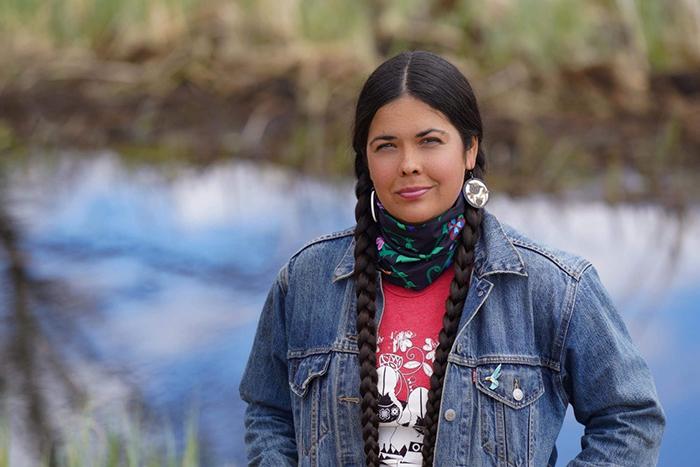
- Details
- By Darren Thompson
“I’m from a rural border town and grew up next to a big lake in a 1970s trailer house, in the forest where it’s still beautiful,” said Tara Houska told Native News Online. “I never dreamed of this kind of recognition, what a wild journey. Deepest gratitude to everyone who has helped me along the way.”
Houska embedded herself in opposing the Line 3 oil pipeline expansion project in northern Minnesota and the Dakota Access Pipeline near the Standing Rock Indian Reservation. She founded the Giniw Collective, an Indigenous women and two-spirit-led resistance dedicated to defending spaces sacred to Indigenous people, advocating for systemic change that respects Indigenous sovereignty, prioritizing land defense, traditional knowledge, and divestment of fossil fuels to protect the Earth.
Houska, a Couchiching First Nations citizen, grew up in Ranier, Minnesota, near the border of Couchiching and earned a B.A., B.S., and J.D. from the University of Minnesota. She went to practice law in Washington, D.C. and clerked in the Obama Administration. Houska also co-founded Not Your Mascots, a non-profit organization that aims to educate the general public on the use of Native American mascots in sports and media. She has contributed op-eds to All We Can Save, The New York Times, CNN, Vogue, and MSNBC. She is a TED speaker and recipient of the 2021 American Climate Leadership Award and the 2019 Rachel’s Network Catalyst Award.
“It’s been my honor to pick up the mantle of so many who came before and keep pushing for space for Indigenous peoples, for nature, for dignity and empathy to be heard and respected,” Houska said. “To push for actions, not just words—for my baby and all those generations to come.”
Houska joins previously honored climate advocates, including Elizabeth Kolbert, Mark Ruffalo, Bill McKibben, and Lisa Jackson. Recipients are carefully vetted and selected by a committee including environmental science faculty, the provost and several leaders in environmental organizations, including a co-founder of the Natural Resources Defense Council. She will be accepting this prestigious recognition at Dickinson’s Commencement on Sunday, May 21.
More Stories Like This
Chilkat Indian Village Tells New Palmer Mine Owners They Are “Not Welcome” in Chilkat ValleyTribes, Coastal Group Ask Army Corps to Revoke Permit for Texas Export Terminal
Michigan Tribes Tell Supreme Court: Don’t Bail Out Enbridge
Alaskans Raise More Than $1 Million For Communities Devastated by Typhoon Halong
A True American Tale: Indigenous Rights vs. Corporate Greed
Help us tell the stories that could save Native languages and food traditions
At a critical moment for Indian Country, Native News Online is embarking on our most ambitious reporting project yet: "Cultivating Culture," a three-year investigation into two forces shaping Native community survival—food sovereignty and language revitalization.
The devastating impact of COVID-19 accelerated the loss of Native elders and with them, irreplaceable cultural knowledge. Yet across tribal communities, innovative leaders are fighting back, reclaiming traditional food systems and breathing new life into Native languages. These aren't just cultural preservation efforts—they're powerful pathways to community health, healing, and resilience.
Our dedicated reporting team will spend three years documenting these stories through on-the-ground reporting in 18 tribal communities, producing over 200 in-depth stories, 18 podcast episodes, and multimedia content that amplifies Indigenous voices. We'll show policymakers, funders, and allies how cultural restoration directly impacts physical and mental wellness while celebrating successful models of sovereignty and self-determination.
This isn't corporate media parachuting into Indian Country for a quick story. This is sustained, relationship-based journalism by Native reporters who understand these communities. It's "Warrior Journalism"—fearless reporting that serves the 5.5 million readers who depend on us for news that mainstream media often ignores.
We need your help right now. While we've secured partial funding, we're still $450,000 short of our three-year budget. Our immediate goal is $25,000 this month to keep this critical work moving forward—funding reporter salaries, travel to remote communities, photography, and the deep reporting these stories deserve.
Every dollar directly supports Indigenous journalists telling Indigenous stories. Whether it's $5 or $50, your contribution ensures these vital narratives of resilience, innovation, and hope don't disappear into silence.
 The stakes couldn't be higher. Native languages are being lost at an alarming rate. Food insecurity plagues many tribal communities. But solutions are emerging, and these stories need to be told.
The stakes couldn't be higher. Native languages are being lost at an alarming rate. Food insecurity plagues many tribal communities. But solutions are emerging, and these stories need to be told.
Support independent Native journalism. Fund the stories that matter.
Levi Rickert (Potawatomi), Editor & Publisher
